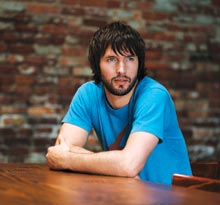“I write songs because I have to, really, to document my own life and understanding of what’s going on and to process all those experiences.” So says pop artist James Blunt, sounding much like my former writing professor. (The professor claimed she rolled out of bed in the morning and wrote a couple pages before even emptying her bladder.)

Coming from Blunt (the guy who wrote the oft-panned chart-topper “You’re Beautiful”), the “I write because I have to” sentiment is easier to swallow. After all, his 2004 debut, Back to Bedlam, earned him near-instant fame, with an opening gig for Elton John and Top 10 chart positions in adult contemporary, adult Top 40 and adult alternative formats. That from a collection of songs never intended for an audience—one that, Blunt diplomatically explains, “had a charm because of its innocence.”
The British singer’s second studio effort, All the Lost Souls (Atlantic, 2007), is both a study in his love affair with songwriting and a nose-thumbing at those who would have proclaimed him a one-trick pony. If “Beautiful” was a fortunate accident, then Souls’ single “1973” is a well-crafted, emotive power-ballad delivering Blunt as a mature artist to a ready audience.
“My songs are all about people growing with them and living with them,” he says. Now on tour in support of Souls, he’s hitting a surprising array of smaller venues (such as the Asheville Civic Center), where he says he can “see the whites of people’s eyes.” Blunt says that this intimate connection is what his music is about, but his theater-versus-arena strategy also speaks to his well-documented dislike of stardom and celebrity.
“There are many musicians who I’d define as successful, but they haven’t necessarily been high up on the charts or sold millions of records … I’ve been commercially successful, which is a very different thing,” he says. “Music is about connection and expression of emotion.”
Which brings us to the creative process behind Souls. Tapping into ‘70s influences from what Blunt calls “the golden era of the singer/songwriter,” he sequestered himself on the Spanish island of Ibiza, where he “had an amazing view where I was writing,” and “the local people didn’t really care [about] what’s going on in Hollywood.”
In the studio, the focus was on capturing the energy of the moment with a band. “What’s more interesting: to listen to a machine or [to hear] the emotion you get from a real human, whatever instrument, whether they’re playing drums or keyboards or bass or guitar?” Blunt asks rhetorically. The palpable longing encapsulated in both the lyrics and the instrumentation of Souls neatly answers his query.
But even more than recording choices, the musician draws from his own poetic inclination toward melancholy. “I have a great sense of nostalgia,” he says. “I really enjoy the sense of what came before. You know, the past is what shapes our present. I have a real strong sense of that and also that sense of sadness of the past.”
He adds, “The song ‘1973’ is a great example of a celebration of a moment but it’s tinged with the sadness that you’ve got to move on. You can’t relive the past.” Yet listeners drawn into the faintly disco thump and sweetly melodic rush of Blunt’s single can go home again to those well-thumbed memories. And, even while he mourns the loss of happy days past, the chronicling of his life through song achieves a bridge of sorts.
“I’ve always said that my songs are misery with a dash of hope,” he quips, adding that common connections are forged by sharing dark moments with others.
On that last point, Blunt seems adamant. His most recent press bio states, “I’m in it for the love of it, and the audience may be a temporary thing.” And the artist tells Xpress, “It depends on how you define success in the first place … Someone like Cat Power I think is a phenomenally successful musician because her albums are beautiful.”
“Beautiful” is Blunt’s catch phrase these days, but he delivers his line with earnest aplomb, just as he delivers Souls with quiet confidence and polish. After all, it’s an album, he says, that is meant to have a life rather than a marketing plan. Blunt is sharp like that, but he also possesses levity.
“It’s only music,” he insists, “and hopefully no one’s going to die from it.”
who: VH1’s “You Oughta Know Tour” featuring James Blunt
what: British pop star and Top 40 chart-topper
where: Thomas Wolfe Auditorium
when: Monday, March 3. 8 p.m. ($27.50 and $35. 251-5505.)



Before you comment
The comments section is here to provide a platform for civil dialogue on the issues we face together as a local community. Xpress is committed to offering this platform for all voices, but when the tone of the discussion gets nasty or strays off topic, we believe many people choose not to participate. Xpress editors are determined to moderate comments to ensure a constructive interchange is maintained. All comments judged not to be in keeping with the spirit of civil discourse will be removed and repeat violators will be banned. See here for our terms of service. Thank you for being part of this effort to promote respectful discussion.